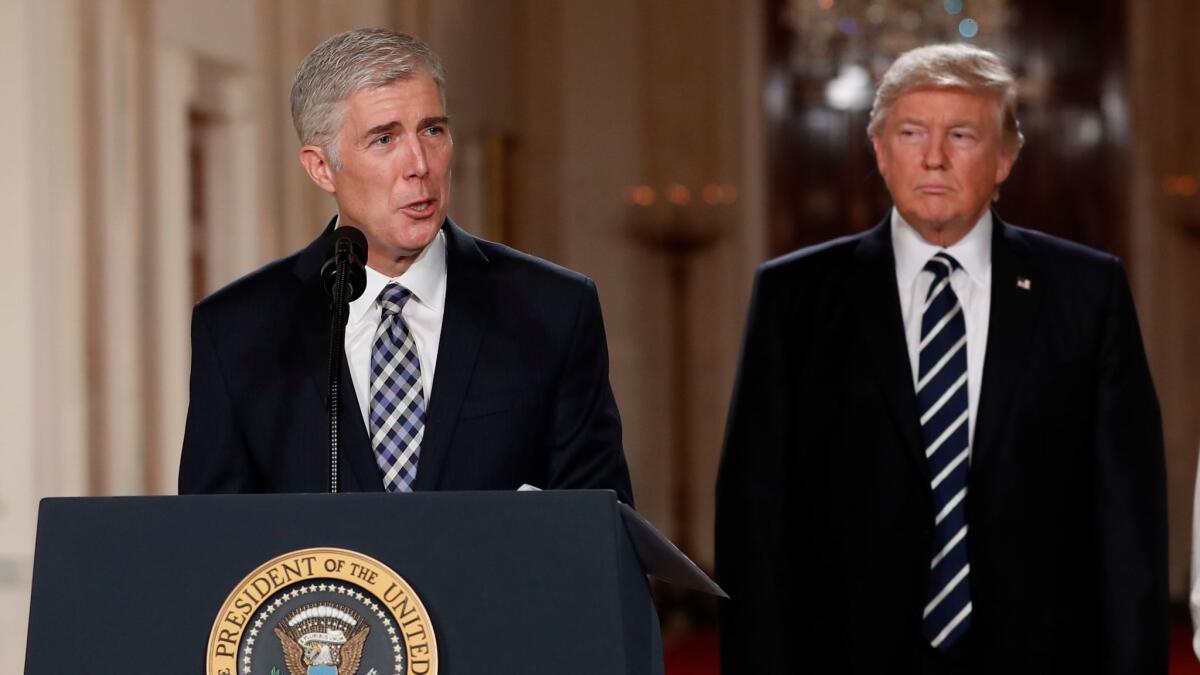Editorial: Trump’s trash talk on judges makes trouble for Gorsuch

- Share via
As a candidate, Donald Trump famously impugned the integrity of a federal judge presiding over a lawsuit against Trump University, suggesting he couldn’t be impartial because of his Mexican ancestry. As president, Trump has continued to attack the independence of federal judges, describing as a “so-called judge” the federal jurist who put a temporary hold on his executive order blocking travelers from seven mostly Muslim countries and suggesting that only politics or bias would lead a judge to rule against the order.
This trash talk about an independent branch of government is disgraceful. Presidents, like any other citizens, have a right to criticize decisions of the courts, and Trump’s predecessors have done so, sometimes in scathing terms. Barack Obama denounced the Supreme Court’s Citizens United decision in a State of the Union address attended by most of the justices. But Trump’s comments have been different. Referring to U.S. District Judge James Robart as a “so-called judge” wasn’t just insulting; it implied that the judge lacked the authority to rule on the legality of Trump’s order.
Trump also has suggested that, by subjecting his order to legal and constitutional scrutiny, the judicial system might be putting the nation at risk. “The judge opens up our country to potential terrorists and others that do not have our best interests at heart,” he warned in one tweet last weekend. “Bad people are very happy!” He followed that with an even more offensive tweet: “Just cannot believe a judge would put our country in such peril. If something happens blame him and court system. People pouring in. Bad!”
Federal judges have life tenure, and they are duty-bound to ignore criticism from presidents or anyone else. Still, when presidents call into question the legitimacy of judges, or, worse, lay the groundwork for blaming them for a terrorist attack, public confidence in the courts can erode. That’s why Trump’s attacks on the judiciary are so dangerous.
They also have sullied what had been one of the few relatively rational moments of his first month in office: the nomination of an experienced and well-respected conservative federal judge to a vacancy on the U.S. Supreme Court. Judge Neil M. Gorsuch now finds himself caught between Democratic senators who demand that he denounce Trump’s attacks on his fellow judges and a president who is notoriously intolerant of what he considers disloyalty.
On Wednesday, Sen. Richard Blumenthal (D-Conn.) said Gorsuch confided in a private conversation that he had found Trump’s criticism of judges “demoralizing” and “disheartening.” That’s hardly surprising, given Gorsuch’s stature in the legal profession and reputation for civility. But a political dispute immediately ensued over whether Gorsuch was referring specifically to Trump’s comments or, as former Sen. Kelly Ayotte (R-N.H.), suggested, saying more generally that “he finds any criticism of a judge’s integrity and independence disheartening and demoralizing.”
Characteristically, Trump rushed to Twitter to accuse Blumenthal of distorting what Gorsuch had said: “Sen. Richard Blumenthal, who never fought in Vietnam when he said for years he had (major lie), now misrepresents what Judge Gorsuch told him?” But the Washington Post reported that Blumenthal’s version of the conversation was vouched for Ron Bonjean, a member of the team guiding Gorsuch through his confirmation process.
Actually, it doesn’t matter much which version is correct: Gorsuch was reacting to Trump’s objectionable comments the way any responsible judge would. And he’ll no doubt have additional opportunities to distance himself from Trump’s tweets at his confirmation hearings, because Senate Democrats are determined to get him on the record on the subject, as much to embarrass the president as to establish Gorsuch’s independence from the man who appointed him. On Thursday Senate Democratic Leader Chuck Schumer of New York upped the ante by demanding that Gorsuch go public with his criticism of Trump: “To whisper to a senator but to refuse to say anything public is not close to good enough to show an independence,” Schumer said.
Fair enough. Fortunately, whatever other objection there may be to Gorsuch’s nomination, independence from the president who appointed him doesn’t seem likely to be one of them. Unlike some other advisors and appointees, the judge isn’t a Trump crony, for which even the nominee’s critics should be grateful.
Follow the Opinion section on Twitter @latimesopinion and Facebook
More to Read
A cure for the common opinion
Get thought-provoking perspectives with our weekly newsletter.
You may occasionally receive promotional content from the Los Angeles Times.









